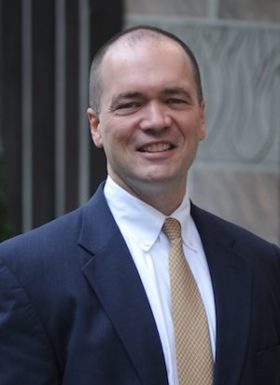In the U.S. Supreme Court case Walker v. Texas Division, Sons of Confederate Veterans, Inc., Elon Law Professor Scott Gaylord is the author of both the amicus brief on behalf the State of North Carolina and scholarship cited four times in the petitioner’s merits brief in the case.

The Supreme Court will hear oral arguments in the case on Monday, March 23. SCOTUSBlog summarizes the issues in Walker v. Texas Division, Sons of Confederate Veterans, Inc. as follows:
“(1) Whether the messages and images that appear on state-issued specialty license plates qualify as government speech immune from any requirement of viewpoint neutrality; and (2) whether Texas engaged in ‘viewpoint discrimination’ by rejecting the license-plate design proposed by the Sons of Confederate Veterans, when Texas has not issued any license plate that portrays the confederacy or the confederate battle flag in a negative or critical light.”
Gaylord’s scholarship, “Kill the Sea Turtles’ and Other Things You Can’t Make the Government Say” is cited in the petitioner’s merits brief in Walker v. Texas Division, Sons of Confederate Veterans, Inc.
Gaylord is also lead counsel in Berger v. ACLU, a case being held over in the U.S. Supreme Court until after the Court decides Walker v. Texas Division, Sons of Confederate Veterans, Inc. Berger raises a similar government speech issue but in the context of legislatively controlled specialty plates instead of the administrative procedure at issue in Walker.
Professor Gaylord’s recent scholarship focuses on the government speech doctrine as well as the free exercise rights of corporations, legislative prayer, and other forms of facially religious government speech.
His recent activity includes:
- presentation before the law faculty at the University of Iowa about “The Government Speech Doctrine Revisited (and Refined?): Walker v. SCV and Berger v. ACLU” on Feb. 27, 2015
- presentation on a panel discussing “For Your Eyes Only: Where Privacy Ends and the Law Begins” as part of Charlotte School of Law’s Ninth Annual Symposium on Feb. 13, 2015
- participation on a panel dealing with “What Hobby Lobby Means for the Religious Liberties of Corporations and their Employees” at the 2015 North Carolina Bar Association Constitutional Rights and Responsibilities Section Annual Meeting in Cary, North Carolina on Jan. 29, 2015
- an invited contribution to the spring 2015 symposium issue of the Journal of Law, Medicine and Ethics titled A Matter of Context: Casey and the Constitutionality of Compelled Physician Speech, which explores the appropriate standard of review for compelled disclosures in the medical context
- an upcoming article in the South Carolina Law Review, Casey and the First Amendment: Revisiting an Old Case to Resolve a New Compelled Speech Controversy, exploring the First Amendment speech issues raised by the Fourth Circuit’s recent decision in Stuart v. Camnitz.
Professor Gaylord is scheduled to present this month before the law faculty at Campbell and to participate in a religious liberties panel at Duke University. He also has been asked to write an article for the National Constitution Center evaluating the oral argument in Walker.
Elon Law Professor Scott Gaylord is a summa cum laude graduate of Notre Dame Law School with a doctorate in philosophy from the University of North Carolina at Chapel Hill and an undergraduate degree summa cum laude from Colgate University. His legal practice experience includes seven years as an attorney with Robinson, Bradshaw & Hinson and service as a law clerk to Judge Edith Jones on the Fifth Circuit Court of Appeals in Houston, Texas. More information about Elon Law Professor Scott Gaylord is available here.


